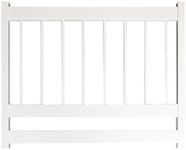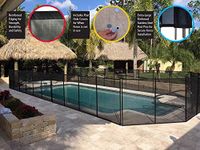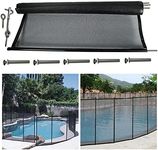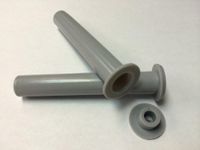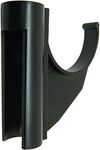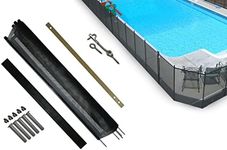Buying Guide for the Best Pool Safety Fence
Choosing the right pool safety fence is crucial for ensuring the safety of children, pets, and even adults around your pool area. A good safety fence acts as a physical barrier, reducing the risk of accidental falls into the water. When shopping for a pool safety fence, it's important to consider not just the look and style, but also the practical features that make it effective and easy to use. Understanding the key specifications will help you select a fence that fits your pool, meets safety standards, and matches your lifestyle needs.HeightHeight refers to how tall the fence stands from the ground. This is important because a taller fence is generally more effective at preventing children and pets from climbing over. Pool safety fences typically range from about 3 to 5 feet in height. Lower fences (around 3 feet) may be easier to see over and less visually intrusive, but they offer less security. Higher fences (4 feet and above) provide better protection, especially for families with young children or larger pets. When choosing the right height, consider the ages and abilities of those you want to protect—if you have toddlers or active pets, a taller fence is usually the safer choice.
MaterialThe material of the fence affects its durability, maintenance, and appearance. Common materials include mesh, metal (like aluminum or wrought iron), and vinyl. Mesh fences are lightweight, see-through, and easy to remove, making them popular for temporary or seasonal use. Metal fences are sturdy and long-lasting, but may require more maintenance to prevent rust. Vinyl fences are low-maintenance and weather-resistant, but can be less visually appealing. Think about your climate, how much maintenance you're willing to do, and whether you want a permanent or removable fence when deciding on the material.
Gate and Locking MechanismThe gate and its locking mechanism are critical for safety, as the gate is the main entry point to the pool area. A self-closing, self-latching gate is recommended because it automatically closes and locks behind you, reducing the chance of accidentally leaving it open. Some gates also have child-proof locks or alarms for extra security. When choosing, consider how easy the gate is to operate for adults, but how difficult it is for children. If you have frequent visitors or children in the home, prioritize a gate with strong, reliable safety features.
Installation TypeInstallation type refers to whether the fence is permanent or removable, and how it is anchored to the ground. Permanent fences are fixed in place and offer the highest level of security, but they require more effort and sometimes professional installation. Removable fences can be taken down when not needed, which is convenient for parties or off-season, but they may not be as sturdy. Consider how often you want to access the pool without a barrier and whether you need flexibility in your setup. If you want a fence that stays up year-round, a permanent installation is best; if you need to remove it occasionally, look for a removable option.
VisibilityVisibility refers to how much you can see through the fence. Good visibility allows you to keep an eye on the pool area even when the fence is up, which is important for supervision. Mesh and some metal fences offer high visibility, while solid panels or privacy fences block the view. If you want to maintain a clear line of sight to the pool for safety or aesthetic reasons, choose a fence with see-through panels. If privacy is more important, a less transparent fence may be better.
Compliance with Safety StandardsCompliance means the fence meets local or national safety regulations, which are designed to ensure a minimum level of protection. These standards may specify things like minimum height, gap size, and gate requirements. It's important to check your local laws or guidelines before buying, as non-compliant fences may not provide adequate safety or could even be illegal. Always look for fences that are certified or labeled as meeting recognized safety standards, especially if you have children or are required by law to have a pool barrier.
